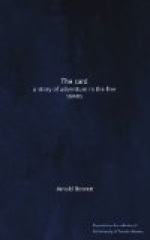Mixed up with papers and sixpenny novels on the bookstall were a number of souvenirs of Llandudno—paper-knives, pens, paper-weights, watch-cases, pen-cases, all in light wood or glass, and ornamented with coloured views of Llandudno, and also the word “Llandudno” in large German capitals, so that mistakes might not arise. Ruth remembered that she had even intended to buy a crystal paper-weight with a view of the Great Orme at the bottom. The bookstall clerk had several crystal paper-weights with views of the pier, the Hotel Majestic, the Esplanade, the Happy Valley, but none with a view of the Great Orme. He had also paper-knives and watch-cases with a view of the Great Orme. But Ruth wanted a combination of paper-weight and Great Orme, and nothing else would satisfy her. She was like that. The clerk admitted that such a combination existed, but he was sold “out of it.”
“Couldn’t you get one and send it to me?” said Ruth.
And Denry saw anew that she was incurable.
“Oh yes, miss,” said the clerk. “Certainly, miss. To-morrow at latest.” And he pulled out a book. “What name?”
Ruth looked at Denry, as women do look on such occasions.
“Rothschild,” said Denry.
It may seem perhaps strange that that single word ended their engagement. But it did. She could not tolerate a rebuke. She walked away, flushing. The bookstall clerk received no order. Several persons in the vicinity dimly perceived that a domestic scene had occurred, in a flash, under their noses, on a platform of a railway station. Nellie was speedily aware that something very serious had happened, for the train took them off without Ruth speaking a syllable to Denry, though Denry raised his hat and was almost effusive.
The next afternoon Denry received by post a ring in a box. “I will not submit to insult,” ran the brief letter.
“I only said ’Rothschild’!” Denry murmured to himself. “Can’t a fellow say ’Rothschild’?”
But secretly he was proud of himself.
CHAPTER V
THE MERCANTILE MARINE
I
The decisive scene, henceforward historic, occurred in the shanty known as “John’s cabin”—John being the unacknowledged leader of the long-shore population under the tail of Llandudno pier. The cabin, festooned with cordage, was lighted by an oil-lamp of a primitive model, and round the orange case on which the lamp was balanced sat Denry, Cregeen, the owner of the lifeboat, and John himself (to give, as it were, a semi-official character to whatever was afoot).
“Well, here you are,” said Denry, and handed to Cregeen a piece of paper.
“What’s this, I’m asking ye?” said Cregeen, taking the paper in his large fingers and peering at it as though it had been a papyrus.




